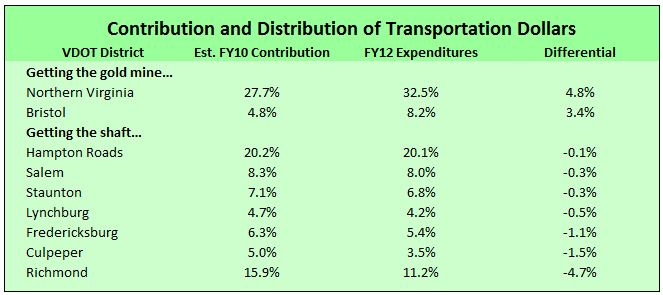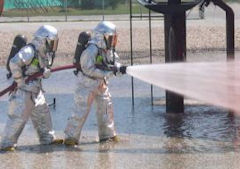Everywhere I go around Virginia, I encounter a universal sentiment: “We’re not getting our fair share of state transportation dollars.” Northern Virginians take it for granted that the politicians in “Richmond” are short-changing their region, the economic engine of the state. Downstaters are equally convinced that NoVa, with its voracious transportation needs, is hogging more than its fair share.
Who’s right?
Sen. Janet Howell, D-Reston, asked the Senate Finance Committee to figure out how much each region of the state pays in transportation taxes and fees and how much money each region gets back. Remarkably, no one had ever made that calculation before, at least not in the 12 years that Jason Powell, the legislative analyst for the SFC tasked with the job, has worked in Richmond. The results he came up with (view here) are surprising — although they must be taken with important caveats.
First, we can drive a spike through the long-held myth that Virginia’s highway funding formula routinely short-changes Northern Virginia. In truth, NoVa, which accounted for 28% of Virginia’s population in Fiscal 2010 and a like percentage of the state’s annual gas tax revenue, received 33% of all transportation dollars in Fiscal 2012.
For all the ire that Northern Virginians direct at “Richmond” — as if the inhabitants of the Richmond region were culpable for the transgressions of state government — the Richmond transportation district, with 15% of the state’s population, contributed 16% of all state highway revenues in FY 2010 and got back only 11% in FY 2012!
Here are the numbers, which I have extracted from Powell’s presentation, ranking the VDOT districts by winners and losers.
 (Click on table for more legible image.)
(Click on table for more legible image.)
Jeff Schapiro, the Times-Dispatch reporter who highlighted the findings in a column this morning, framed the issue from a downstate Virginia perspective:
When it comes to total state spending, Northern Virginia consistently plays the victim. Its legislators yowl that the region, with its usually robust, federally fed economy, keeps the entire state afloat. That’s a tad hyperbolic. Because personal income in Northern Virginia is higher than the statewide average, the area generates more revenue relative to its percentage of the total population.
This is what literally makes Virginia a commonwealth: It shares its wealth.
As for highway finance, Northern Virginia can’t scream poverty. Of nine transportation districts, two — Northern Virginia and Bristol — take out more than they chip in. Bristol, with 4.6 percent of the population, produces 4.8 percent of road revenues, but draws 8.2 percent.
Schapiro’s analysis may appeal to downstate politicians, but the caveats are important. First, there is no way to know exactly how much tax revenue each transportation districts contributed. Powell made an estimate based upon population, Vehicle Miles Traveled and tax data. His assumptions are reasonable, but they are still assumptions.
More important, Powell provides only a one-year spending snapshot. While the tax revenue percentages won’t vary much from year to year, he says, the distribution of state transportation dollars will. Indeed, the numbers are already out of date: They do not include $200 million that the Commonwealth Transportation Board recently transferred to the Culpeper District to pay for the Charlottesville Bypass and related improvements.
The numbers could shift even more — and not in NoVa’s favor — when the McDonnell administration begins spending funds from $3 billion in bond issues on mega-projects such as the Norfolk-Portsmouth Mid-Town Tunnel, U.S. 460 corridor improvements and the Coalfield Expressway.
“There is year-to-year variability,” Powell told me. “I was just trying to do the most rigorous analysis I could.”
Will the analysis change anyone’s mind? Probably not. NoVa partisans can argue that FY 2012 is an aberration. And they may be right. We can hope that Powell will update his figures annually. In another 10 or 12 years we might have enough data to settle the debate once and for all.



